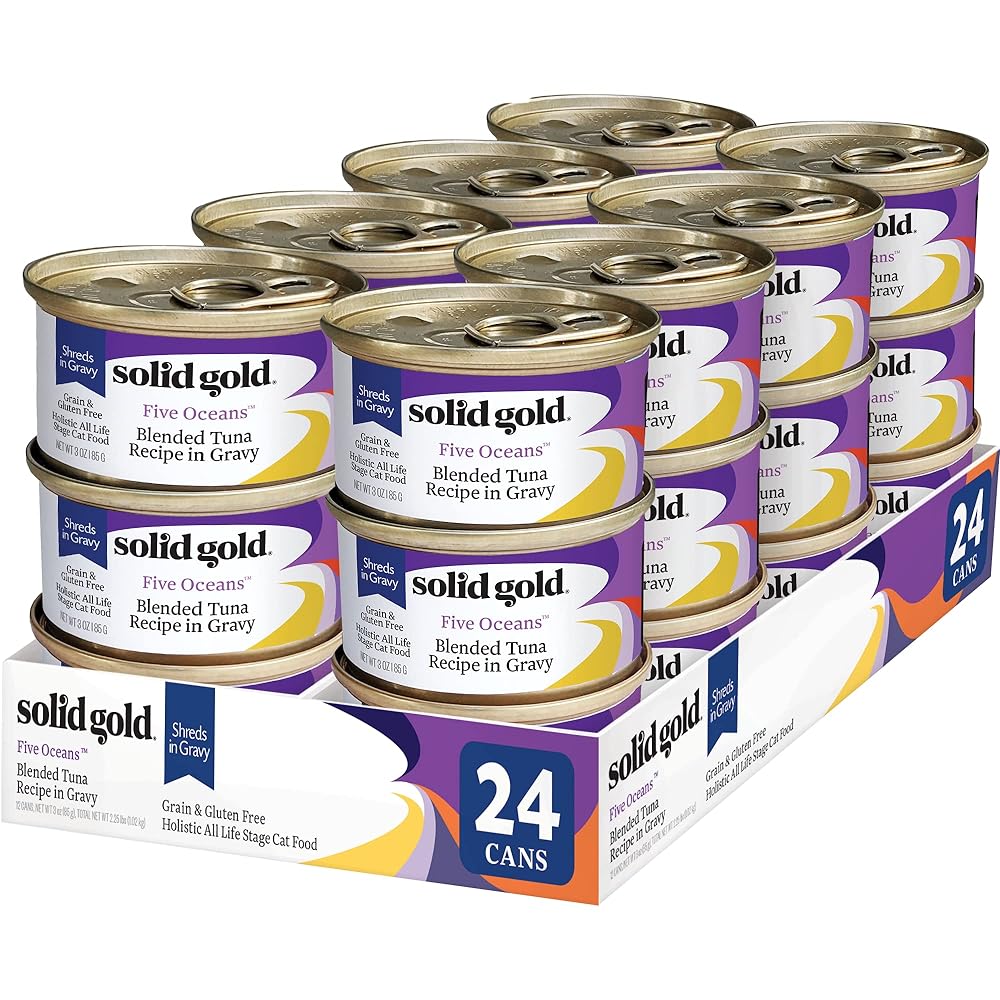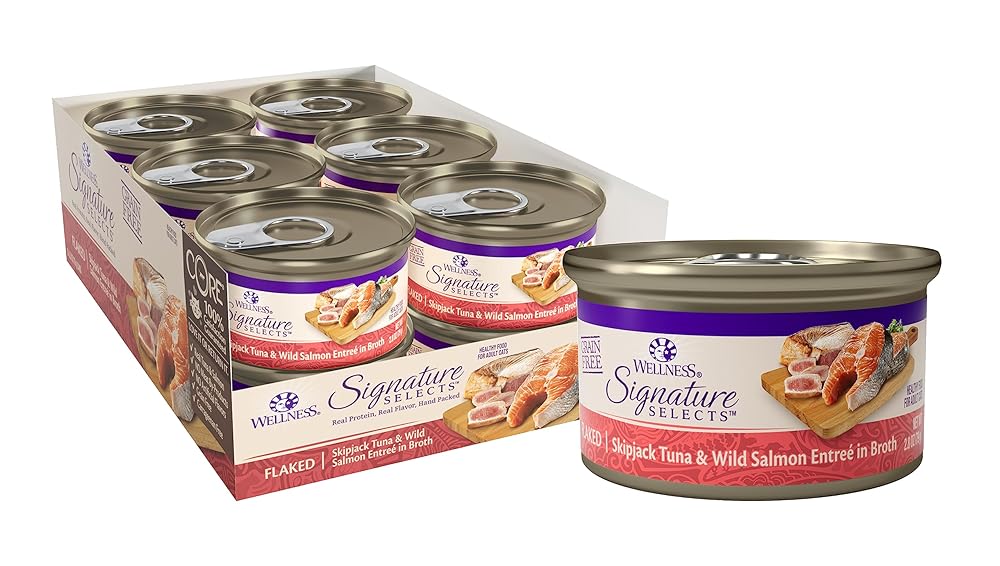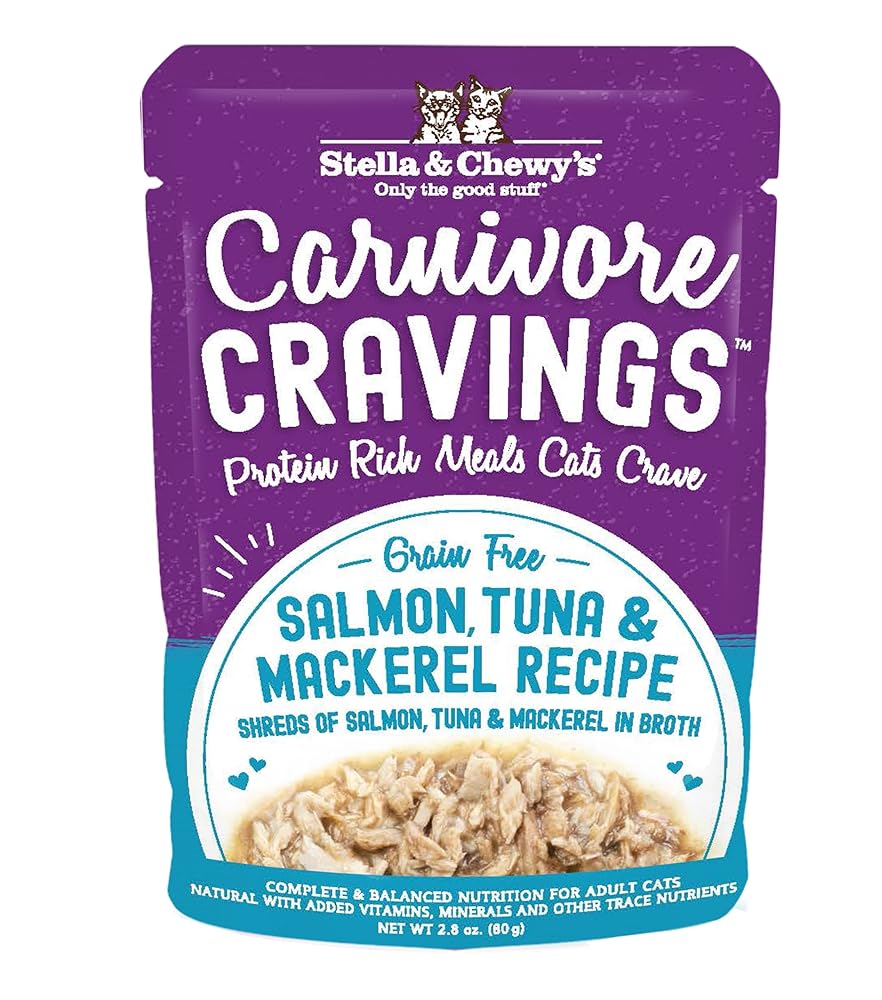As a specialist in cat health and nutrition, I know how important it is to select the right food for your feline companion. Tuna-based cat foods are particularly popular among cat owners, owing to their high protein content and the natural palatability of fish. However, it’s crucial to navigate this category wisely, considering factors like the nutritional balance, mercury content, and sustainability practices of the tuna source. In this article, we’ll guide you through the best tuna-based cat foods on the market to help you make a choice that is both nutritious and enjoyable for your cat.
#1 – Reveal Natural Wet Cat Food, 12 Pack, Limited Ingredient, Grain Free Food for Cats, Tuna Fillet in Broth, 5.5oz Cans
Reveal Natural Wet Cat Food is a 12-pack of limited-ingredient, grain-free cat food made with 100% natural ingredients and real protein. It does not contain any artificial flavors, colors, or preservatives. The variety of flavors and textures is great for picky eaters, and it can be used as a complimentary addition to any dry cat food for a complete and balanced diet.
Best For: Best ingredient sourcing.
#2 – Solid Gold Wet Cat Food Shreds in Gravy – Canned Cat Food Made w/Real Tuna for Cats of All Ages – Five Oceans Grain Free Cat Wet Food for Sensitive Stomach & Overall Wellness – 24ct/3oz Can
The Solid Gold Wet Cat Food Shreds in Gravy is a canned cat food made with real tuna for cats of all ages. It is a grain-free and gluten-free blend of seafood, gravy, and other premium ingredients. This cat food is packed with protein, vitamins, minerals, and amino acids to support your cat’s overall wellness.
Best For: Cats of all ages, especially those with sensitive stomachs. Best on a budget.
#3 – Wellness CORE Grain-Free Signature Selects Wet Cat Food, Natural Protein-Rich Recipe, Made with Real Flaked Skipjack Tuna & Wild Salmon, 2.8oz Cans (Pack of 12)
The Wellness CORE Grain-Free Signature Selects Wet Cat Food is a protein-rich canned cat food made with real flaked skipjack tuna and wild salmon. It is designed to support a cat’s daily needs, with protein as the first ingredient. The wet food is also formulated to provide daily hydration and does not contain any artificial colors or preservatives.
Best For: Supporting a cat’s daily hydration and protein intake. (best ingredient sourcing)
#4 – Blue Buffalo Tastefuls Natural Pate Wet Cat Food, Ocean Fish & Tuna Entrée 5.5-oz cans (Pack of 24)
The Blue Buffalo Tastefuls Natural Pate Wet Cat Food is a canned cat food that is made with protein-rich whitefish as the first ingredient. It features a savory pate texture that is appealing even to finicky cats. The food is also high in moisture content, promoting hydration in cats. Best For: Cats who enjoy flavorful wet food without artificial ingredients.

#5 – Stella & Chewy’s Carnivore Cravings Wet Cat Food Pouches – Grain Free, Protein Rich Meal, Topper or Treat – Salmon, Tuna & Mackerel Recipe (2.8 Ounce Pouches, Case of 24)
Stella & Chewy’s Carnivore Cravings Wet Cat Food Pouches are grain-free, protein-rich meals that can be served as a full meal, food topper, or treat. The recipe includes real muscle meat, such as wild-caught salmon, tuna, and mackerel, and is drenched in a delicious broth. This nutritious formula is free from grains, gluten, and carrageenan, and supports whole-body health, including digestion, skin, coat, heart, and vision health.
Best For: Cats who crave protein-rich meals and owners on a budget.
#6 – Purina Fancy Feast Grilled Wet Cat Food Tuna Feast in Wet Cat Food Gravy – (24) 3 oz. Cans
The Purina Fancy Feast Grilled Wet Cat Food Tuna Feast in Wet Cat Food Gravy is a high-quality canned cat food made with real tuna and a savory gravy. It is crafted without artificial colors or preservatives and is designed to provide complete and balanced nutrition for cats. This wet cat food has been developed in partnership with nutritionists to create a unique and memorable taste experience for your cat.
Best For: Cats who prefer wet food with real tuna.
What Are The Benefits of Tuna-Based Foods for Cats?
Tuna-based foods can offer several nutritional benefits for cats, although it’s essential to consider them as part of a balanced diet. Here are some of the advantages:
- High-Quality Protein: Tuna is a high-quality source of animal protein that provides essential amino acids for muscle growth, tissue repair, and overall bodily functions. Protein is a critical nutrient for cats, who are obligate carnivores.
- Omega-3 Fatty Acids: Tuna is rich in omega-3 fatty acids like EPA and DHA, which support skin and coat health, reduce inflammation, and can help in the cognitive development of kittens.
- Palatability: Many cats love the taste of fish, including tuna. This can be especially beneficial for finicky eaters or cats that are on a specific dietary regimen for medical reasons.
- Micronutrients: Tuna also provides some essential micronutrients like selenium, vitamin B12, and niacin, which are necessary for a variety of physiological processes, from energy metabolism to immune function.
- Hydration: Wet tuna-based cat foods have high moisture content, which can help keep cats hydrated. This is particularly useful for cats that don’t drink enough water or have urinary tract issues.
It’s crucial to note that while tuna-based foods have their benefits, they should be offered in moderation due to concerns about mercury content and nutrient imbalance (e.g., low levels of certain essential nutrients like taurine and arachidonic acid). Always consult your veterinarian before making significant changes to your cat’s diet.
Frequently Asked Questions About Tuna Cat Foods
1. Is tuna a good source of protein for my cat?
Yes, tuna is a high-quality source of protein that provides essential amino acids needed for muscle development and repair. However, it should not be the sole protein source in your cat’s diet due to potential nutrient imbalances.
2. How often can I feed my cat tuna-based food?
While tuna is nutritious, it should not make up the majority of your cat’s diet due to concerns about mercury levels and nutrient imbalances. Consult your veterinarian for specific feeding guidelines tailored to your cat’s needs.
3. Are there concerns about mercury in tuna-based cat foods?
Yes, mercury is a concern in tuna and other predatory fish. While occasional servings are generally considered safe, excessive consumption can lead to mercury toxicity. It’s best to limit the amount of tuna-based food in your cat’s diet and consult your veterinarian for guidance.
4. Can I feed my cat canned tuna meant for humans?
Canned tuna for humans is not balanced for a cat’s dietary needs and often contains added salt or flavorings that can be harmful. It should not replace specially formulated cat food but can be an occasional treat in small quantities.
5. What are the omega-3 benefits of tuna-based cat foods?
Tuna is rich in omega-3 fatty acids, which can help support healthy skin and coat, reduce inflammation, and contribute to cognitive and heart health.
6. Is tuna-based food suitable for kittens?
Tuna-based food can be suitable for kittens if it is specifically formulated to meet their growth needs, which include higher protein and fat content. However, variety in protein sources is generally recommended.
7. Do tuna-based cat foods contain bones or by-products?
The quality of tuna-based cat foods can vary. High-quality options should be free from harmful bones or low-quality by-products. Always check the ingredient list for details.
8. How do I transition my cat to a tuna-based diet?
Transition to any new food, including tuna-based diets, should be gradual to prevent digestive upset. Start by mixing the new food with your cat’s current food and gradually increase the proportion over 7-10 days.
9. Are there sustainably sourced tuna-based cat foods?
Yes, some brands offer tuna-based foods that are sustainably sourced. Look for certifications or labels indicating sustainable fishing practices if this is important to you.
10. Can tuna-based foods cause allergies?
Fish is a common allergen for cats. If you notice symptoms like itching, digestive upset, or other signs of an allergic reaction after introducing tuna-based food, consult your veterinarian.
Conclusion: Best Tuna Cat Foods
Choosing the right cat food is not just a matter of taste preference; it’s a decision that greatly impacts your cat’s long-term health and well-being. While tuna-based foods can offer high-quality protein and omega-3 fatty acids, it’s important to consider other aspects like mercury levels, sustainability, and the overall nutritional profile of the food. Armed with the insights provided in this article, you’re better positioned to choose a tuna-based cat food that aligns with both your cat’s nutritional needs and your own values of responsible pet ownership.





